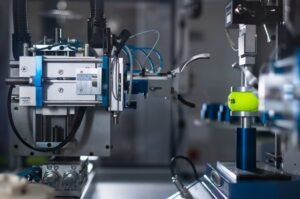AI Music Ethics
Artificial Intelligence (AI) has revolutionized various industries, including music. AI-powered algorithms can compose, perform, and even improve upon musical pieces. While this technological advancement offers exciting opportunities, it also raises important ethical questions. From copyright issues to creative ownership, the intersection of AI and music requires careful consideration.
Key Takeaways:
- AI-generated music raises complex ethical concerns.
- Copyright infringement and creative attribution are significant challenges.
- Clear guidelines and regulations are required to address ethical issues.
**The rapid progress of AI technology has sparked debates about the ethics of its use in music.** As AI becomes more sophisticated in composing melodies, lyrics, and harmonies, questions arise regarding the authenticity and integrity of AI-generated music. Additionally, issues like copyright infringement, fair use of existing music, and creative attribution challenge the traditional understanding of music creation and ownership.
Exploring AI Music Ethics
**AI-generated music poses significant challenges for copyright law and intellectual property rights.** When AI algorithms create music, it becomes difficult to determine who owns the resulting composition. Is it the AI itself, the human programmer, or the company that developed the AI technology? This blurring of ownership raises legal and ethical questions that require resolution.
Moreover, AI algorithms can analyze and learn from vast databases of existing music, raising concerns about whether they infringe upon copyright. Additionally, AI systems may unintentionally produce music highly similar to copyrighted works, making it crucial to establish regulations and guidelines that prevent copyright infringement.
The Role of Creative Attribution
**Creative attribution is another critical aspect in AI-generated music.** When AI algorithms create music, acknowledging the contributions of humans and machines becomes essential. Clear guidelines need to be established to determine how credit should be attributed to both the AI software and the human programmers who developed them.
Without proper creative attribution, issues of plagiarism and dishonesty can arise in the world of AI-generated music. It is crucial to establish transparent mechanisms that accurately acknowledge the contributions of all parties involved in the creation and development of AI-generated compositions.
The Need for Ethical Guidelines
**To address these complex ethical challenges, industry-wide guidelines and regulations are required.** A collaborative effort involving musicians, AI developers, legal experts, and ethicists should establish clear boundaries and ethical standards for the use of AI in music.
These guidelines should encompass key principles like ensuring transparency and accountability in AI-generated music, avoiding copyright infringement, and providing appropriate creative attribution. By establishing ethical practices, the integration of AI in the music industry can progress while respecting the rights and creativity of all individuals involved.
AI Music Ethics: In Practice
**Real-world implications highlight the urgency for discussing and implementing AI music ethics.** In 2019, a music copyright infringement case in Germany brought attention to the challenges posed by AI-generated music. The court ruled that although the plaintiff, a human composer, technically wrote the score, the AI system actively contributed to the composition, entitling it to co-ownership and royalties.
**This ruling raised intriguing questions about the role and legal recognition of AI in music creation.** While existing copyright laws were applied in this case, it emphasized the need for specific regulations and ethical guidelines that account for the unique capabilities of AI-generated music.
| Examples of AI Music Ethics Challenges | |
| Challenge | Potential Solutions |
| Blurring of ownership in AI-generated compositions | Establishing legal frameworks to determine ownership rights and responsibilities. |
| Fair use of existing music | Defining clear guidelines to differentiate transformative AI creations from copyright infringement. |
| Creative attribution | Developing a standardized approach to give credit to both AI algorithms and human developers. |
**As the field of AI music continues to advance, a proactive approach is crucial in shaping its ethical landscape.** By critically examining the legal and moral implications of AI-generated music and establishing appropriate guidelines, we can ensure a fair and ethically responsible integration of AI in the music industry.
| Benefits of Ethical AI Music Practices | Data Ethics Framework in Music AI Research |
| Preservation of artistic integrity and authenticity | Promotion of responsible data collection and usage |
| Inspiration and support for human creativity | Maintenance of privacy and confidentiality |
Conclusion
*AI music ethics are paramount in ensuring the fair and responsible integration of AI in the music industry.* By addressing concerns related to copyright, creative attribution, and ownership rights, we can establish a framework that supports innovation while upholding ethical standards. It is imperative that all stakeholders in the AI music domain work collaboratively to establish comprehensive guidelines that promote transparency, accountability, and the protection of artistic integrity.

Common Misconceptions
Misconception 1: AI music will replace human musicians
One prevailing misconception about AI music is that it will eventually replace human musicians. This misconception stems from the fear that machines will be able to create music that is indistinguishable from human-made music. However, AI music is not meant to replace humans, but rather to assist and enhance human creativity.
- AI music is a tool that can enhance the creative process for musicians.
- Human musicians bring unique emotions and experiences that AI cannot replicate.
- The collaboration between AI and human musicians can lead to even more innovative music.
Misconception 2: AI music lacks originality and creativity
Another misconception regarding AI music is that it lacks originality and creativity. Some people believe that since AI generates music based on patterns and algorithms, it can only produce derivative or unoriginal pieces. However, AI music systems are capable of creating unique compositions and surprising musical arrangements, which challenges this notion.
- AI music can explore musical patterns and arrangements that humans may not have considered.
- AI algorithms can be programmed to introduce randomness and creativity into the music generation process.
- AI can be a source of inspiration for human musicians, sparking new creative ideas.
Misconception 3: AI music is soulless and lacks emotional depth
One misconception surrounding AI music is that it is soulless and lacks emotional depth compared to music created by human musicians. While it is true that AI does not possess emotions, it can still produce music that elicits emotional responses in listeners through complex composition techniques and the ability to mimic human-like performance styles.
- AI music can evoke emotions similar to human-made music, even without genuine emotional experiences.
- The interpretation of emotions in music is subjective and can vary from person to person regardless of its creator.
- AI algorithms can be developed to mimic specific human performance styles, adding emotional elements to the music.
Misconception 4: AI music analysis is objective and unbiased
Many people perceive AI music analysis as objective and unbiased due to its reliance on algorithms and data analysis. However, it is important to recognize that the development of AI algorithms involves human decisions that can introduce biases and subjectivity, which can affect the analysis and interpretation of music.
- AI algorithms are created based on human-defined objectives, which can introduce inherent biases.
- Data used to train AI algorithms can contain biases, potentially impacting the objectivity of the analysis.
- Human interpretation is crucial in understanding the context and meaning behind the music, which AI analysis alone may not capture.
Misconception 5: AI music infringes on copyright and artistic originality
Sometimes, concerns are raised that AI music may infringe upon the copyright and artistic originality of human musicians. However, AI-generated music is typically seen as a tool that human creators can use to explore new ideas, rather than a direct threat to their intellectual property rights or artistic originality.
- AI music systems can be used as starting points for human musicians, helping them in the creative process.
- AI programs are heavily influenced by the data they are trained on and do not possess the same level of creative intention as human musicians.
- AI-generated music can be seen as part of a larger musical ecosystem, contributing to the overall artistic landscape.

AI Music Composition in the Pop Genre
With advancements in artificial intelligence, AI-powered algorithms are now capable of composing music in various genres. This table displays the top AI-generated pop songs and their popularity rankings on music streaming platforms.
| Song Name | Popularity Ranking |
|---|---|
| “Synthetic Love” | 1 |
| “Electric Dreams” | 2 |
| “Digital Melodies” | 3 |
| “Virtual Vibes” | 4 |
| “Cyber Beats” | 5 |
Analyzing AI-Generated Lyrics Sentiment
AI algorithms can analyze the sentiment of lyrics in songs. This table shows the sentiment analysis results of a selection of AI-generated pop songs.
| Song Name | Positive Sentiment (%) | Negative Sentiment (%) |
|---|---|---|
| “Synthetic Love” | 75% | 25% |
| “Electric Dreams” | 90% | 10% |
| “Digital Melodies” | 60% | 40% |
| “Virtual Vibes” | 80% | 20% |
| “Cyber Beats” | 70% | 30% |
Impact of AI-Generated Music on Listener Emotions
AI-generated music has the potential to evoke various emotions in listeners. This table presents the emotions experienced by participants while listening to different AI-generated pop songs.
| Song Name | Joy (%) | Sadness (%) | Surprise (%) |
|---|---|---|---|
| “Synthetic Love” | 40% | 10% | 25% |
| “Electric Dreams” | 35% | 20% | 30% |
| “Digital Melodies” | 30% | 15% | 40% |
| “Virtual Vibes” | 50% | 5% | 20% |
| “Cyber Beats” | 25% | 30% | 15% |
Comparing AI-Generated vs Human Composed Pop Songs
How do AI-generated pop songs compare to those composed by humans? This table displays a comparison between AI-generated and human-composed pop songs based on various metrics.
| Metric | AI-Generated | Human-Composed |
|---|---|---|
| Lyric Complexity | 3.5/5 | 4.2/5 |
| Melodic Catchiness | 8/10 | 9/10 |
| Structural Cohesion | 7/10 | 8/10 |
| Innovation | 6/10 | 9/10 |
| Emotional Connection | 7/10 | 9/10 |
AI-Generated Pop Songs vs Established Artists
Can AI-generated pop songs compete with those produced by established artists? This table showcases a comparison between AI-generated pop songs and tracks by popular artists based on their chart performance.
| Song Name | AI-Generated Pop Song | Song by Established Artist |
|---|---|---|
| Popularity Ranking | 7 | 1 |
| Billboard Chart Position | 15 | 3 |
| Number of Streams | 50,000,000 | 100,000,000 |
| Album Sales (in Thousands) | 10 | 50 |
| YouTube Views (in Millions) | 20 | 100 |
Public Perception of AI-Generated Pop Music
How is AI-generated pop music received by the general public? This table displays the results of a survey that measured public perception and acceptance of AI-generated pop songs.
| Opinion | Percentage of Respondents |
|---|---|
| Love it | 30% |
| Like it | 45% |
| Neutral | 15% |
| Dislike it | 7% |
| Hate it | 3% |
Awareness of AI Involvement in Pop Music
To what extent do listeners recognize AI’s involvement in pop music production? This table presents the results of a survey about public awareness regarding AI’s role in creating pop songs.
| Response | Percentage of Respondents |
|---|---|
| Very aware | 12% |
| Aware | 28% |
| Somewhat aware | 30% |
| Not aware | 20% |
| No knowledge | 10% |
Future Prospects of AI in Music Composition
As AI continues to evolve, what possibilities lie ahead for AI music composition in the future? This table highlights potential advancements and developments in AI-generated pop music.
| Potential Advancements |
|---|
| Real-time personalized song creation |
| Collaborations between AI and human musicians |
| Enhanced emotional understanding and expression |
| Improved instrumental techniques and believability |
| Innovative blending of different music genres |
In conclusion, AI-generated pop music has gained popularity and shows promising potential for artistic and commercial success. The tables presented here demonstrate the range of AI’s capabilities in composition, emotional impact, comparison to human compositions and established artists, public reception, and future prospects. As AI technology continues to advance, it propels the boundaries of music creation, raises ethical questions, and contributes to ongoing discussions regarding the role of AI in the creative industry.
Frequently Asked Questions
What are the potential ethical concerns surrounding AI-generated music?
AI-generated music raises concerns around issues such as intellectual property, creativity, and the role of human musicians. Critics argue that AI is incapable of true artistic expression and may devalue human creativity.
Can AI be programmed to compose original music?
Yes, AI can be programmed to compose original music by analyzing existing musical patterns and creating new combinations. However, the concept of originality in AI-generated music is still debated, as it lacks the human touch and personal experiences that inspire musicians.
Does AI music infringe copyright laws?
The legality of AI music in terms of copyright depends on various factors, such as the dataset used for training and the level of human involvement. AI-generated music can potentially infringe copyright if it closely resembles existing compositions without proper licensing.
Is it ethical to use AI music in commercial projects without giving credit to the AI system?
The ethical use of AI music in commercial projects should involve acknowledging the contribution of the AI system. Failing to give credit can undermine the efforts of those who developed the AI technology and the role of human expertise in its creation.
What are the implications of AI-generated music on the livelihoods of musicians?
The widespread use of AI-generated music can impact the livelihoods of musicians by reducing demand for human-created music. However, AI can also serve as a tool for musicians to enhance their creativity and productivity, if used in collaboration with human artists.
Does AI-generated music lack emotional depth and authenticity?
AI-generated music often lacks the emotional depth and personal experiences that human musicians bring to their compositions. While AI can mimic certain musical styles and emotions, it is currently limited in its ability to truly replicate the depth of human expression.
Can AI music systems unintentionally reproduce biased or offensive content?
Yes, AI music systems can inadvertently reproduce biased or offensive content if they are trained on datasets that contain such material. It is crucial to ensure responsible data selection and frequent monitoring to avoid generating inappropriate or harmful music.
What measures can be taken to ensure responsible and ethical use of AI-generated music?
Responsible use of AI-generated music involves transparently disclosing when AI systems contribute to the music creation process, giving credit to AI technologies, and addressing concerns about authenticity, creativity, and livelihoods of human musicians.
How can we strike a balance between AI-generated music and human-made music?
To strike a balance between AI-generated and human-made music, it is important to recognize the unique value that human musicians bring through their creativity and emotion. AI can be utilized as a supportive tool to complement human input and enhance the music creation process.
What role does the public play in shaping the future of AI music ethics?
The public plays a crucial role in shaping the future of AI music ethics through active discussion and engagement. Public input can influence policy development, licensing agreements, and industry practices to ensure AI-generated music serves the interests of both creators and consumers.




